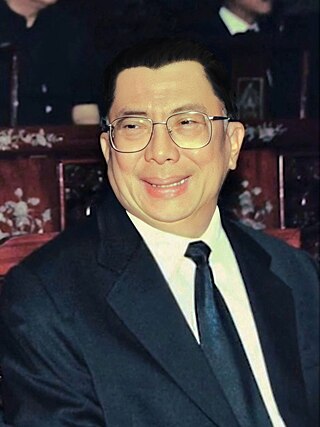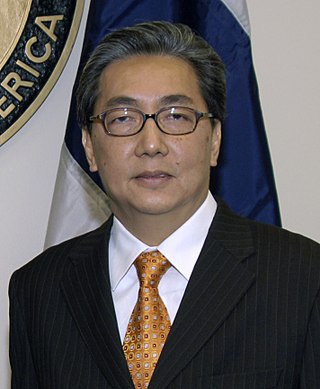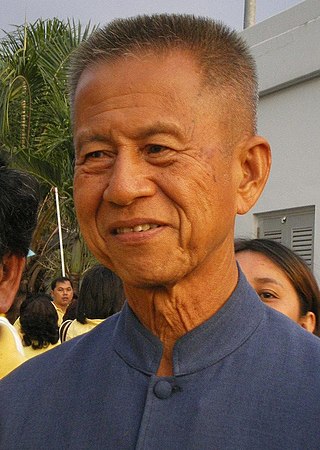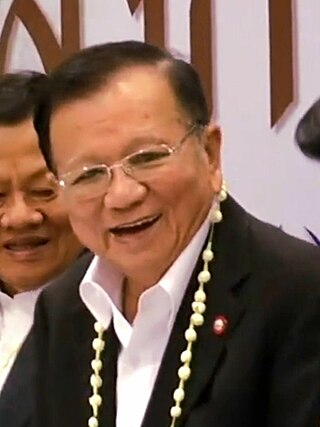It has been suggested that this article be merged into Thaksin Shinawatra . (Discuss) Proposed since November 2023. |
This article has no lead section .(August 2021) |
It has been suggested that this article be merged into Thaksin Shinawatra . (Discuss) Proposed since November 2023. |
This article has no lead section .(August 2021) |
Thaksin Shinawatra entered politics in late 1994 at the invitation of Chamlong Srimuang, who had just reclaimed the position of Palang Dharma Party (PDP) leader from Boonchu Rojanastien. In a subsequent purge of Boonchu-affiliated PDP cabinet ministers, Thaksin was appointed foreign minister in December 1994, replacing Prasong Soonsiri. [1] [2]
The PDP soon withdrew from the government over the Sor Por Kor 4-01 land reform corruption scandal, causing the government of Chuan Leekpai to collapse.
Chamlong, strongly criticized for mishandling internal PDP politics in the last days of the Chuan-government, retired from politics and hand-picked Thaksin as new PDP leader. Thaksin ran for election for the first time in July 1995, winning a parliamentary seat from Bangkok. However, the weakened and internally divided PDP won only 23 seats, compared to 46 in the 1992 elections.
Thaksin joined the government of Banharn Silpa-acha and was appointed deputy prime minister in charge of Bangkok traffic. In May 1996, Thaksin and four other PDP ministers quit the Banharn cabinet (while retaining their MP seats) to protest widespread allegations of corruption, prompting a cabinet reshuffle. Many have claimed that Thaksin's move was designed to help give Chamlong Srimuang a boost in the June 1996 Bangkok Governor elections, which Chamlong returned from retirement to contest. [3] Chamlong lost the election. He and incumbent governor, former PDP-member Krisda Arunwongse na Ayudhya, were defeated by Pichit Rattakul, an independent.
Chamlong's failure to buttress the PDP's failing power base in Bangkok amplified internal divisions in the PDP, particularly between Chamlong's "temple" faction and Thaksin's faction. Soon afterwards, Chamlong announced he was retiring again from politics.
Thaksin and the PDP pulled out of the Banharn-government in August 1996. In a subsequent no-confidence debate, the PDP gave evidence against the Banharn government. Soon afterwards, Banharn dissolved parliament in September 1996.
Thaksin announced that he would not run in the subsequent November 1996 elections, but would remain as leader of the PDP. He claimed that he wanted to devote his energies to campaigning for political reform and supporting other PDP candidates. Some speculated that Thaksin wanted to resign from the party leadership. The PDP suffered a fatal defeat in the elections, winning only 1 seat in parliament. The PDP soon imploded, with most members resigning. However, the PDP is still in existence, with a different leadership and an insignificant presence in the political sphere.
Although there was much controversy about the root causes of the fall of the PDP, most agree that it was due to internal divisions in the party. Particularly divisive were conflicts between the Chamlong "temple" faction and subsequent generations of outsiders, including Thaksin.
On 15 August 1997, Thaksin was invited to become Deputy Prime Minister in Chavalit Yongchaiyudh's government. This occurred soon after the Thai baht was floated and devalued on 2 July 1997, sparking the Asian Financial Crisis. Thaksin held this position for only 3 months, leaving on November 14 after Chavalit resigned.
During an unsuccessful censure debate on 27 September 1997, Democrat Suthep Thaugsuban accused Thaksin of profiting on insider information about the government's decision to float the baht. [4] However, this accusation was not investigated during the subsequent Democrat or TRT governments. [5] During 1997, Thaksin's flagship company, AIS, suffered 1.8 billion baht in foreign exchange losses and saw its debt more than double due to the devaluation. However, critics have alleged that Thaksin's businesses suffered much less from the devaluation than rival companies. [6]
Thaksin founded the Thai Rak Thai (TRT) ("Thais Love Thais") party in 1998 along with Somkid Jatusripitak, PDP ally Sudarat Keyuraphan, Purachai Piumsombun, [7] and 19 others.
With a populist platform often attributed to Somkid, TRT promised universal access to healthcare, a 3-year debt moratorium for farmers, and one million baht locally managed development funds for all Thai villages.
After Prime Minister Chuan dissolved parliament in November 2000, TRT won a sweeping victory in the January 2001 elections, the first election held under the People's Constitution of 1997. It was called the most open, corruption-free election in Thai history. [8] Thai Rak Thai won 248 parliamentary seats (more than any other party previously) and needed only 3 more seats to form a government. Nonetheless, Thaksin opted for a broad coalition with the Chart Thai Party (41 seats) and the New Aspiration Party (36 seats), while absorbing the smaller Seritham Party (14 seats). [9]

Until 22 May 2014, the politics of Thailand were conducted within the framework of a constitutional monarchy, whereby the prime minister is the head of government and a hereditary monarch is head of state. The judiciary is independent of the executive and the legislative branches.

Thaksin Shinawatra is a Thai businessman and politician. He served in the Thai Police from 1973 to 1987, and was the Prime Minister of Thailand from 2001 to 2006.

The Thai Rak Thai Party was a Thai political party founded in 1998. From 2001 to 2006, it was the ruling party under its founder, Prime Minister Thaksin Shinawatra. During its brief existence, Thai Rak Thai won the three general elections it contested. Eight months after a military coup forced Thaksin to remain in exile, the party was dissolved on 30 May 2007 by the Constitutional Tribunal for violation of electoral laws, with 111 former party members banned from participating in politics for five years.

The history of Thailand from 1973 to 2001 saw an unstable period of democracy, with military rule being reimposed after a bloody coup in 1976.

Thai Nation Party, or Chart Thai Party was a conservative political party in Thailand. It was dissolved by the Constitutional Court of Thailand on December 2, 2008, along with the People's Power Party and the Neutral Democratic Party, for having violated electoral laws in the 2007 Thai general election. Thereafter, most MPs founded the Chartthaipattana Party, which became the Thai Nation Party's successor.

Black May, also known as "Bloody May", was a series of mass protests and subsequent crackdowns by security forces and police in Bangkok in May 1992. A rally of over 200,000 people led by Chamlong Srimuang was held on 17 May, caused by the extending of the military regime of Suchinda Kraprayoon, the 1991 Thai coup d'état leader. An estimated 52 to 100 protesters were killed, 696 were injured, and 175 had "disappeared" afterwards. King Bhumibol Adulyadej summoned both Chamlong and Suchinda on 20 May, and the Suchinda regime later received a sweeping amnesty along with other law reforms, signed by Bhumibol.

Chavalit Yongchaiyudh, also known as "Big Jiew", is a Thai politician and retired army officer. From 1986 to 1990 he was the Commander-in-chief of the Royal Thai Army (RTA), and Supreme Commander of the Royal Thai Armed Forces from 1987 to 1990. In 1990 he founded the New Aspiration Party which he led until 2002. He was Thailand's 22nd Prime Minister from 1996 to 1997. At various times he has held the positions of Deputy Prime Minister, Minister of Defence, Minister of the Interior, Minister of Labour and Leader of the Opposition.
General elections were held in Thailand in April 2006. Elections for the lower house of the Thai National Assembly, the House of Representatives, were held on 2 April 2006 and elections for the upper house, the Senate, were held on 19 April 2006. The Constitutional Court later invalidated the House of Representatives election results and ordered a new round of voting.

Somkid Jatusripitak is a Thai economist, business theorist, and politician.
In 2005 and 2006, a series of events occurred in Thailand as a result of public anger with Prime Minister Thaksin Shinawatra that was supported by Sondhi Limthongkul and his coalitions. It led a military coup that concluded in the overthrow of the Thai Rak Thai government in September 2006, the flight of Thaksin after the court verdict, and the establishment of the junta government led by Surayud Chulanont, a favourite of privy councillor and senior statesman Prem Tinsulanonda.

Sudarat Keyuraphan is a Thai politician and former member of the Pheu Thai Party. She participated in protests in May 1992. She was a former minister who held various positions during Thanksin Shinawatra and Chuan Leekpai government. Currently, she is the chairman of the Thai Pueng Thai Foundation, as well as the founder, and leader of the Thai Sang Thai Party.

Chamlong Srimuang is a Thai activist and former politician. A former general, he was a leader of the "Young Turks" military clique, founded and led the Palang Dharma Party, served for six years as governor of Bangkok, led the anti-military uprising of May 1992, and is a prominent member of the People's Alliance for Democracy, a group strongly opposed to former prime minister Thaksin Shinawatra. Chamlong had supported the military junta that overthrew Thaksin in a coup. A devout Buddhist and follower of the Santi Asoke sect, he is now celibate, a vegetarian, and claims to have no worldly possessions. Chamlong Srimuang received the Ramon Magsaysay Award in the category of Government Service in 1992.

The Palang Dharma Party was a Buddhist-inspired political party in Thailand founded by Chamlong Srimuang in 1988, associated with the Santi Asoke sect of Buddhism. The Thai word tham can be used to refer both to "morality", and "dharma", the teachings of Buddhism. Phak Phalang Tham was a political party, not to be confused with its precursor, Ruam Phalang, the campaign group that backed Chamlong Srimuang in the 1985 Bangkok gubernatorial election. To some extent, the PDP evolved into a political party from Ruam Phalang. The latter group was largely made up of Santi Asoke devotees, former Young Turks, and other political activists and community leaders. Many of the PDP's early members were drawn from the ranks of Ruam Phalang.

Prasong Soonsiri is a Thai politician, and former Royal Thai Air Force squadron leader, Thai Foreign Minister, and Secretary-General of the National Security Council.

Boonchu Rojanastien was a Thai banker. Touted as Thailand's first "economics tsar", he served in the government of Kukrit Pramoj in 1975 and 1976. During his tenure as finance minister, he initiated a policy of "ngern phan", which distributed several billion baht of government funds to 5,000 tambon, or local government, councils. His populist policies would later be embraced under the administration of Thaksin Shinawatra.

Mom Ratchawongse Chatumongol Sonakul is Thailand's former Labour Minister and a former permanent secretary of the Ministry of Finance of Thailand, and Governor of the Bank of Thailand.

The People's Power Party is a defunct Thai political party. The party leader was Somchai Wongsawat, the Party Secretary General was Surapong Suebwonglee, and the Party Spokesperson was Kuthep Saikrajarng. Most MPs of the party originally hailed from the Thai Rak Thai Party and thus the party was its de facto reincarnation with former prime minister Thaksin Shinawatra as its "leader." The PPP had a populist platform and was strong in the North, Central, and Northeastern regions of Thailand. The party became the leader of the coalition government after the junta-government supported 2007 general election. PAD, the leading anti-Thaksin movement, vowed to oppose it after the party decided to launch the amendment of the 2007 Constitution.

Chalerm Yubamrung is a Thai politician. He was a Member of Parliament representing the Pheu Thai Party, and was one of the Deputy Prime Ministers of Yingluck Shinawatra from 2011 to 2013. His past political appointments include floor leader of the Pheu Thai Party, brief terms as Health Minister under Somchai Wongsawat, Interior Minister under Samak Sundaravej, Justice Minister under Banharn Silpa-archa, and Leader of the Opposition from 2009 to 2011.

Sanoh Thienthong is a Thai politician. He is a Member of Parliament for the Pheu Thai Party list. Before he joined the Pheu Thai Party in 2011, he was the leader of the minor Pracharaj Party. Earlier functions include Minister of Public Health and Interior Minister. Sanoh played a supporting role in the rise to premiership of Banharn Silpa-archa, Chavalit Yongchaiyudh, Thaksin Shinawatra and Surayud Chulanont

Somsak Thepsuthin is a Thai politician and one of deputy prime ministers of Thailand under Srettha Thevisin's cabinet. He served as Minister of Justice in the second cabinet of Prime Minister Prayut Chan-o-cha.